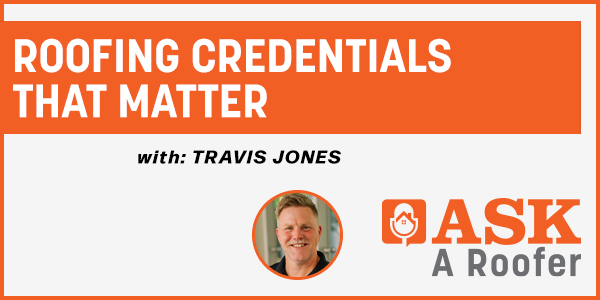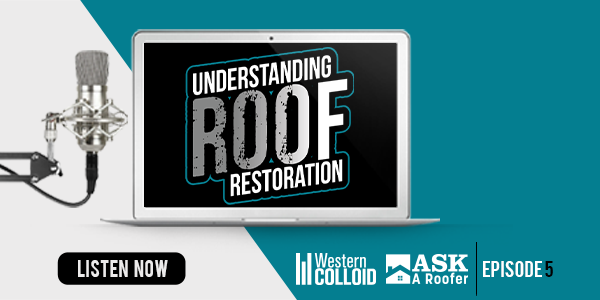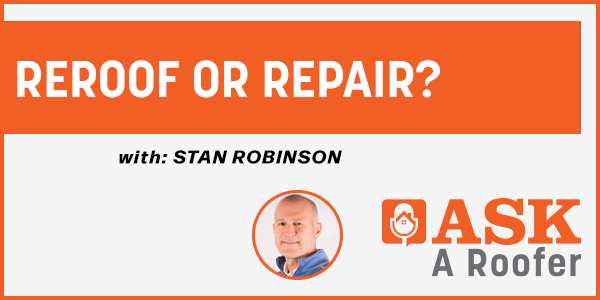Travis Jones - Roofing Credentials That Matter - PODCAST TRANSCRIPT
May 12, 2025 at 10:00 a.m.Editor's note: The following is the transcript of a live interview with Travis Jones from Smart Roof and Home Performance. You can read the interview below or listen to the podcast.
Intro: Welcome to the AskARoofer Podcast, where all your roofing questions find their answers. Your hosts, Megan Ellsworth and Lauren White, peel back the layers of the roofing world to reveal the knowledge, tips and FAQs you've been curious about. From shingles to skylights, metal to asphalt, we're here to demystify the system above your head. So get ready to ask, learn and explore the fascinating world of roofing, one question at a time on the AskARoofer Podcast.
Lauren White: Hello everyone, this is Lauren White with the AskARoofer Podcast and we have an exciting guest and an exciting topic today. We're talking about roofing credentials and licensing and memberships and why all of this matters and why homeowners should be paying attention to it. So Travis is here to share all of his knowledge and insights. Travis, thank you for being here. We appreciate it.
Travis Jones: Yeah, thank you. Thanks for having me.
Lauren White: And why don't we just start with having you introduce yourself and who you are, what you do.
Travis Jones: Sure. So my name is Travis Jones. I'm the owner of Smart Roof & Home Performance in Dallas, Texas. I started the company about two and a half years ago and I've been in the roofing industry since 2017, so basically eight years now. So that's what we do, we do roofing and we also, the home performance side of the business is our insulation and performance testing that we do.
Lauren White: Great. Awesome. So like I said, today we're talking about certifications, licensing and why that matters. So why is it important for homeowners to understand a contractor's license and certifications before hiring them to work on their roof?
Travis Jones: It's a good question and it really differs from state to state. So in Texas, we do not have a roofing license. The only license you can get is a voluntary license through our state organization, which is RCAT. So I have that license. You have to be in business two years, so I got it as soon as I could, last fall. But I'm one of, I think the last time I heard, maybe 350 roofers in Texas have that license of the over 10,000 companies. So there's not a lot that have it, so we start to wonder if it's even worth it.
And I can really just speak to my market. Where I think it's worth having a licensed contractor is the first word I think I'll pick is accountability. It gives some form of accountability. Having a driver's license doesn't mean you're going to be a good driver. But if you're a bad driver, they can take that license away. So I think making sure your contractors are licensed, starting there. If you do a bad job, it gives a place for a homeowner to reach out and say, "I don't think they did this right. I don't think this is to code." And it gives them some kind of recourse.
It's hard to get our courts to do anything. It's hard to get the city inspectors to really do anything. So we need some form of accountability and I think licensing provides that.
Lauren White: Yeah, definitely. And you were mentioning earlier that in the state of Texas there's some shifting going around with that licensing. Can you tell us about that?
Travis Jones: Yeah, so right now, the Texas House is in session and they are considering a bill that would make licensing mandatory for roofers. And there's passionate people on both sides of the argument. The side that's against it often feels like it's just a rubber stamp kind of thing. I think sometimes permits feel the same way in this market. We do pull permits for our jobs, but really all that when we call in to get the roof inspected, really the only thing I'll get a red tag for is if my guys forgot to put the dump receipt with the permit. They're not really making sure we tore down to the deck, they're not doing anything. So you could argue and I sometimes think this, that getting a permit's just like paying a toll at the toll booth. There's no teeth. But if I had to choose between getting it or not getting it, I think there's reasons to get it.
But I do understand the argument where people are... They think licensing is going to be hard to enforce. They think it's going to maybe give people a false sense of security like, "Oh, he's licensed, he must know what he's doing." And I think that's a cop out, to use that excuse. I think having licensing, having accountability, having a process is ultimately going to protect homeowners.
So to have, for right now, even the voluntary license I have, again, you have to be in business at least two years before you're eligible and then you have to pass a test. And it's not that hard of a test, but if you didn't know anything about roofing, you wouldn't pass it. You've got to know enough. And then you have to prove that you have insurance. And then you have to sign a code of ethics and then you are responsible to do continuing education hours every year.
So I just think there's something there that can give homeowners at least some sense of, okay, at least this guy cares enough to invest in himself and his company. So I think that's probably the reason I would be for mandatory licensing. But until then, I think having the voluntary license is something that really any roofing company in Texas should go for. And if any other state where it's voluntary, they should... I think that's important. I think it's good for homeowners to have licensed contractors.
Lauren White: Oh, totally. And we say it all the time on this podcast and on AskARoofer in general, but do your homework, right? It's important if you're having somebody-
Travis Jones: Yeah, for sure.
Lauren White: ... do work on your roof, you really want to make sure that it's getting done properly and you are taking the steps and doing your homework to make sure that they're licensed and insured and have checked all those boxes for that accountability, like you were saying.
Travis Jones: Yeah. Homeowners, I bet there's not a lot of Pinterest boards out there on the components of a roof.
Lauren White: I don't think so.
Travis Jones: There's a bunch of Pinterest boards on bathrooms and kitchens or outdoor living. So that's not to guarantee that those contractors do those things right, but at least those are the kinds of projects where the homeowner is going to be a little nitpicky. "Hey, that didn't look right. That doesn't line up. That's not right." They're not doing that on their roof. Most of them aren't getting on their roof and they shouldn't get. Just want to-
Lauren White: Right.
Travis Jones: You got to be safe. But so how do we give them some kind of confidence that their roof is done correctly? And like you said, I think doing your homework, doing your own research helps. I think that's part of the process. And then I think we can and we can get into more of these things as we talk, but I think there's other ways they can educate themselves and then also protect themselves by being in the know about what happened on my roof.
Lauren White: Yeah, for sure. So an additional step that contractors can take is, besides getting licensing, insured, is getting certified through different companies. Like you are IKO certified, right?
Travis Jones: Right.
Lauren White: So tell us about that and what that means and why that's kind of just an additional thing to be looking at when you're researching roofers.
Travis Jones: So all of the manufacturers and there's multiple good ones, so we're IKO and we're also GAF certified. I've installed a lot of Owens Corning shingles in the past with my other company. I've installed Malarkey shingles with another company. So there's a lot of really good shingles out there and good manufacturers. And the truth is they want their products to succeed and so to see their products succeed, they want them installed correctly. So having some kind of a certification for their roofers and say, "If you go through our training and if you put on a full, our system," which we can talk about that too, what a system is, but if you do that, then you are eligible to register for the extended warranties.
So I'll give you an example where that matters. I am helping a client right now. She got a roof five years ago and by a reputable manufacturer, I'm not going to name them. That roof, she had me get on it because of some wind storms and she wanted to make sure it was okay. I got on it, the roof was actually okay, except I noticed it was blistered all over. So I'm kind of looking around, okay, they've got ridge vent, they have soffit vents. The ventilation looks okay. What is happening? And I said, "I think you need to file a warranty claim."
We went through the process and the manufacturer did, to their credit, they said, "We agree, this is a warranty claim. We are going to pay for this roof," except they're not paying for the whole roof because there was not an extended warranty put on it. So what they're paying for, shingles and a little bit of labor and that's it. They're not paying for the accessories, they're not paying for tear off. In other words, this homeowner was going to be stuck with a very large bill.
We actually worked with one of their reps who was able to get some other things covered for us. So they're still going to have to come out of pocket, it's more like paying a deductible. But if that roof had an extended warranty in the exact same scenario, they would have zero out of pocket for a brand new roof. So that's where doing that research to say, "Are they going to install a system and register the warranty?" It doesn't happen a lot, but it happens enough that it matters.
Lauren White: Right.
Travis Jones: And then the system component, let me talk about that for a second.
Lauren White: Yeah.
Travis Jones: So a roof is a system. We talk about, we like the shingles, that's where we're picking the color or the look of the shingle. But there's shingles, there's underlayment, there's felt, ice and water shield, starter shingle, hip and ridge shingle, those are the accessories. Manufacturers prefer that you install not only their shingle but all of their accessories because they made it to be a system to work together. And let's be honest, if you put on a roof that had one company's shingle and one company's ice and water shield and one company's felt and there was a failure, it gives all of them a way to go, "It's his fault. It's his fault."
In fact, my neighbor had that happen. He had the ice and he asked me, said, "What is dripping down my fascia?" And it was like black tar dripping down the fascia and it was the ice and water shield in the valley was melting. But that was not the same brand as the shingle and so he couldn't get either one of them to pay for it. The ice and water shield people were like, "Oh, it's the shingles' fault." The shingles said... Right? So that can feel like a cop out and maybe it is, but I just think if I'm a homeowner, I want to know you're going to put on a full system that carries the best warranty possible so that I'm protected in case of a product failure.
Lauren White: Yeah, totally. Saving you money in the long run.
Travis Jones: Yes. Absolutely.
Lauren White: For sure. Yeah, [inaudible 00:10:49]-
Travis Jones: And it may cost a little more, those systems. You can always, if you shop around, you can put together a cheaper system and it may be fine, right? I'm not saying it's going to fail, but it's just that protection of having the extended warranty that comes by being certified through the manufacturer and then installing their system.
Lauren White: Right. and that peace of mind too, knowing that that system is built to last for X amount of years. Right?
Travis Jones: Right.
Lauren White: Because some products might not last as long or be covered for as long as the shingles or what have you.
Travis Jones: Yeah and it comes down to a lot of that coverage, it's about when does it become a prorated versus a non-prorated coverage? So that's where when you extend those warranties, you're extending the non-prorated portion, meaning okay, if this roof were $40,000 10 years from now, but it's prorated to a third of it, they cut... Now you're not going to get as much. Versus if you have 25, 30, 50 years of non-prorated coverage, then whenever that roof fails, you're going to get the full replacements. Kind of like an insurance, the difference between replacement cost versus actual cash value. So having that non-prorated warranty as long as you can have it is ideal.
Lauren White: Yeah. For sure. Man, so much information. So knowing this about the importance of certifications and licensing, what do contractors need to do to earn these different types of certifications for manufacturers, get their license, maybe even some memberships too? What does that look like?
Travis Jones: Sure. One of the first places contractors can turn to is their suppliers, the distributors, because they all have reps that they make their money when you buy from them. It's a commission job. But they're there to serve you and to help you, so you can say... We were doing almost exclusively IKO and I had installed GAF in the past, but I was like, "I want to add one more. For now, I want to add one more to what we offer, one more asphalt shingle." So I chose GAF and that was literally because of Jason at Roadrunner Supply, who is a big GAF guy, but he's been in the industry 30 years. He's a huge resource.
So I'll call him, he'll answer the phone. He helped me kind of get started and introduced me to a GAF rep. So that's been a great relationship. So you lean into the people that you're buying from first and then they'll help you and they're like, "Oh, let's get you certified." And then, so the rep, Jordan, she got us certified. So you just start with those relationships. So I think that's a great place to start.
And then there's things like our local chapter is called NTRCA, the North Texas Roofing Contractors Association. They have a monthly lunch and learn. You don't have to be a member to go to the lunch and learn. So go to those lunch and learns and start to build relationships with other roofers. Because when I applied to become a member of NTRCA, part of the application says, "Who do you know? Who's sponsoring you that's a current member? So you go build those relationships with other contractors.
Yeah, I do some training for IKO and talk about their systems a lot. And when we're all in this room, a bunch of contractors together, I say, "Hey, look around the room and don't think about these people as your competition. Think about them as your colleagues." We need colleagues. We need people to call and go, "Man, what are you doing about this? How are you solving this issue? Have you run into this?""
And there are so many gracious, generous business owners who are willing to give their time, their knowledge. They want to see the industry get better as well. So like we say, "Hey, a rising tide lifts all boats." I had a guy call me yesterday. He was like, "Hey, I heard you're the guy that does FORTIFIED roofs," which I know we'll talk about later. "Can you help me learn about it?" I said, "Sure." So we spent 30 minutes on the phone talking about it. He said, "Can I call you again if I run into a problem?" "Absolutely."
So back to your question, where do you start? You go find your local organizations, lean into those relationships, lean into the suppliers. That's why I love and I won't name them, I love over the big box stores, they all sell shingles too, but I love the actual suppliers that they're there for all your needs, logistics. We've had our suppliers bring in special products for us and yeah, you might be able to go and put together an order that's cheaper at the big box store for the same shingles, but you don't get the same support. So that's a great place to start, find...
And fortunately, there's lots of great... ABC and Beacon and SRS, Pacific and Roadrunner. They're all great. I don't have a problem with any of them. I think they're all there to help the industry and so lean into those and lean into your local organization, that's kind of where I would start.
Lauren White: Yeah, for sure. I think that's what's so unique about the roofing industry is that people can come together for those lunch and learns or for just, "Hey, call this person." And it's not about the competition, everybody's there to help each other. And it is still competitive, a competitive industry, but everybody wants to see the other person succeed, which I think is pretty cool in roofing.
Travis Jones: Yeah. Listen, there's plenty of work out there. The race to the bottom, as I say, the race to the bottom knows no end. There's always going to be guys cheaper. But I don't think there will ever be too many people that say, "We do it right. We pull permits, we register warranties, we build to code." There's just not ever going to be too many contractors like that, I don't think, because there's too many... The incentives are not there for everybody. Some people want to take the shortcuts and so the people that want to do it right and they care about that, we benefit by helping each other.
Lauren White: Yes, for sure. So what would be your advice for a homeowner who's listening to this, who's going to be looking to hire a contractor? What should they be looking for as they're doing their homework? We talked about licensing, being insured. Maybe it's being a member of an association or some other kind of business association. What would you recommend?
Travis Jones: Yeah, so I think most of our business is referral based, so they're already coming to us from someone they know. But there's different kinds of referrals. It may be maybe there's someone you know really well and you trust and they've had someone do that work and they refer you. That's one kind of referral. Others, it's like, "Oh, I heard that guy's a roofer." Someone may pass along your name.
You want to, the first thing is check references. If you don't... Depending on how well you know the person that sent you that roofer or if they came and door knocked and you've chosen to go with that person, which, hey, we all... I started door knocking. Just because you're door knocking doesn't mean you're doing it wrong, but you should be able to check references.
Everybody likes to say, "Hey, read reviews," and I think reviews are good. Take those reviews with a grain of salt. And make sure, dig deep. Unfortunately, there's a lot of fake reviews out there, so you want to look at reviews and see what you can understand. And honestly, even a bad review's not a bad thing. If there's a bad review, how did they respond to it? Most people are reasonable, but not everyone is. So maybe it's an unreasonable person. So you've got to do your homework there.
And then go and search. Are they part of an organization? Find out from them what shingles do you install? Are you certified? Do you register the warranties? Those are some great questions to ask. And then do you pull a permit? Are you insured? Can I see a copy your insurance? And sometimes, again, this is how you protect yourself. So they need to be insured. Sometimes we've even given letters of recommendation from our suppliers because if somebody's behind with their supplier, the supplier can go after the homeowner, a lot of homeowners don't know that. If the guy didn't pay their bill.
So there's ways to vet and it's really worth it. I know in a market like DFW, sometimes people do get roofs way too often, it feels like every couple of years, but let's just say a roof's going to last 15 plus years. That's a big investment and you're protecting your home with that investment. I know it's a hassle and roofing's not a sexy thing, but take the time to dig in and do some research and maybe understand a little bit about what goes into a roof.
I always tell people, make sure that they're tearing down to the deck so they can inspect the decking. That's part of installing to code and to manufacture specs. But there's still, unfortunately, plenty of times I'll see it. And the old felt paper's up there and they're reroofing on top of it. Or we're reroofing a house where we're tearing off like four layers of felt, which means the last three roofers just put felt on top of felt. Ask them if they're going to change the flashing. Say, "Do I have proper ventilation? How do you know?"
But it takes the customer really taking time to do some research. Fortunately, there's lots of great videos on YouTube. There's ways you can do that research. You can go to manufacturer sites yourself. You can go to the, like RCAT and NTRCA, they have resources for homeowners. FORTIFIED is a place where people are going and finding great resources. So you got to do your homework if you're a homeowner, if you want to make sure that it's done well,
Lauren White: Definitely. Yeah. And AskARoofer, you can find a lot of that information on the site too.
Travis Jones: Absolutely.
Lauren White: So since we're talking about FORTIFIED and we brought it up a couple of times, let's dive into that a little bit more and explain what it is and why it's also important.
Travis Jones: Yeah. FORTIFIED is a construction, it's a set of construction standards. So there's actually FORTIFIED home gold and silver, but both of those also have a FORTIFIED roof, so we're just going to talk about the FORTIFIED roof. FORTIFIED roof, it can be done in a new construction, but we're doing it most of the time in a reroof scenario. We're saying we're going to take off the old roof and this time we're going to put a roof back that is going to be to the FORTIFIED standard.
What that means is FORTIFIED is a standard that was developed by IBHS, which is the Insurance Institute for Business and Home Safety. That would be a good, something to put in the show notes or something, ibhs.org. They do research on resilience. They have a lab in South Carolina where they build homes, roll them into their big warehouse where they have 105 six-foot diameter fans that can generate category three hurricanes, winds.
Lauren White: Geez.
Travis Jones: Hit it with wind, hit it with rain and they do that. And then they say, "Okay, how many nails did we put in that deck? What are the steps that we took to build that roof? What lasted? What didn't?" And out of all that research, what they've been doing for decades, they developed the FORTIFIED standard, which I think came out around 15 years ago.
It started in all the hurricane areas, so North Carolina, South Carolina, coastal Mississippi, Alabama. Florida is kind of their own deal. A lot of what Florida does with their standards is very similar to FORTIFIED, but they're kind of... Florida man, Florida's a different animal. We won't talk about Florida. I love people in Florida.
But FORTIFIED started with the idea of resisting hurricanes. So it's really all the wind uplift things. We re-nail the decking with... Every four inches, we put a ring shank nail in the deck, which is a lot of nails. Then there's a couple of different ways to do the sealed roof deck, but we will tape... We do our, what's called the taped seam method. So just like people are used to seeing nowadays, new construction, they see the green zip board and the black tape. Well, this is the idea of if it works on a vertical surface, how about on a surface that's at an angle, it's going to even take more water. Let's tape those seams. So you tape those seams.
And then when we put our felt paper on, we have to do and we use synthetic felt, we have to put a button cap nail every six inches where they overlap and every 12 inches in the field, which is probably three times the number of nails the crews would normally use on that step. And then when we put the shingles on, we're going to nail it with six nails. And then the edge details, we're using a better drip edge, nailed. It's a 26 gauge drip edge that goes two inches on the deck and is nailed every four inches.
See, a lot of these components before you get to the shingle, the mentality is, oh, you're just tacking it into place until you can put the shingles on. FORTIFIED said, "Let's make every layer matter, so that if wind tears off your shingles, your underlayment isn't going to come off very easily because of all the cap nails." And if that comes off and now it rains, you have a sealed roof deck. And they've proven this with, IBHS prove this in their lab. 95% of the water that would normally get in a house without, with open seams, it keeps out 95% of that water. So that could be the difference between needing a new roof and needing a new living room.
Lauren White: Right.
Travis Jones: Water damage moving out, it just drives up costs. So IBHS, it's an insurance industry funded research arm to come up with more resilient roofs to lower what they're having to pay out. So that serves them, but the good news is that also serves the homeowners because who wants to have to replace their roof more often or have water damage in the house? Right? Water's the enemy, it destroys buildings. We got to keep water out. So that's what a FORTIFIED roof is.
And then in our market, we'll add a class 4 shingle, so it's a hurricane rated FORTIFIED roof plus the hail supplement, they call it. But here's the catch. In order to get a roof certified, you have to be a certified FORTIFIED contractor. So I heard about it two years ago. Immediately I thought, "This is what I've been waiting for my whole roofing life. This is amazing." I got certified, we started doing the FORTIFIED in Dallas-Fort Worth two years ago in 2023 and we've done a number of them. And I just had a call earlier today from a farmer's agent. He said, "Hey, we have this discount we can do for FORTIFIED and we have this... We can add an endorsement so people can, when it's time to replace the roof, they'll get upgraded to FORTIFIED. But I'm looking in the database, you're like the only guy I can find around here," which it's still amazing to me. There are a few in the database, but I'm one of the few that's actually doing it because you have to upsell it. You have to charge extra to do it.
Eventually, it's kind of where the standard's going. But because I'm a certified contractor, I can install it, but it doesn't end there. And this is back to kind of really the theme of what we're talking about today. In order to get that roof certified, a third-party evaluator takes pictures, reviews our pictures, comes to the job site, makes sure we used all the right materials and followed all the steps. That evaluator does not work for me, they work for the homeowner. The homeowner hires the evaluator. The evaluator submits the pictures to get the certification from FORTIFIED. And if you don't follow the steps, they will reject it. Can you imagine upselling someone and they're like, "You actually..." And by this time, they may have already even paid you. And then they get a notice from FORTIFIED that says, "This didn't pass." So uh-oh, you're coming back out to redo something, right? To fix it.
So I think it's one of the few trades that has this whole third-party verification built in. And I can't think of a better way to protect homeowners than to have third-party verification. And I think that's probably the most important part of the whole thing.
Lauren White: Yeah. Absolutely. Yeah, FORTIFIED. Man, whole new world.
Travis Jones: Absolutely.
Lauren White: Yeah. So I guess for homeowners then, having all this information about FORTIFIED and licensing and insurance, how can all of those different elements impact the long-term performance and durability of a roof? I know we've kind of touched on it a little bit throughout but-
Travis Jones: No, that's good. So let's go back to, we're known in Dallas-Fort Worth for hail all the time, but we've had actually quite a few wind storms this season and last year. And we had a tornado in 2019, a major windstorm, so we've been getting more wind events.
Well, the wind storms we've had the last few months, I get calls and I'll go out and get on a roof and the only thing that's missing, the only thing the wind blew off is the hip and ridge. The field shingles are fine. The hip and ridge shingles were blown off. Now, the ridge and hips, those are high vulnerable, they're vulnerable spots, so it kind of makes sense. Except most of the time, the contractor that installed that roof where they lost their hip and ridge shingles, did not install actual hip and ridge shingles. What they did is they bought three-tab shingles and cut them into basically each three-tab makes one starter shingle, they'll use it for starter instead of starter or they'll cut it and use it for hip and ridge.
If that was a roof, if I was trying to do that as an IKO roof and register for their ironclad warranty, I couldn't do that. I have to use hip and ridge. I have to use the product that's designed for that purpose. So just by that shortcut, which saves a few hundred dollars, that put that roof at risk.
And it also created an event that they had to call someone. Maybe they filed a claim and the insurance guy came out and is like, "Oh, this is not... No, it's just your hip and ridge." But that costs money. That costs the insurance money to send, they paid that guy to go out there. Just the simple thing of using three-tab for hip and ridge has added who knows how much ultimately to our premiums, if you think about it.
So there was a neighborhood in Waxahachie, which is south of us here. And I drove by it a couple of weeks ago and you could see tarped with felt hips, hip roofs all over the neighborhood. I didn't see any in the middle of the field, it was all the hips. And I promise you, they used three-tab shingle. Even contractors at one of my suppliers said he'll have guys that have ordered class 4 shingles for the field and they still order three-tab and do the hip and ridge with three-tab.
So here's what all did we just say? Well, we just said, "First of all..." Now, technically, I don't think it's even against code. You could do it that way, but it's not what it's designed for. A three-tab is usually installed perfectly, in the field, it's rated for 60 mile per hour winds. Well, these are 70, 80, 90 mile per hour winds. And by the way, it's not even designed to go on a hip. The sealants in the wrong place. Whereas if you get a hip and ridge shingle, those aren't going to blow off with 60, 70, 80 mile per hour winds if they're put in right.
So that's homeowners doing their research, knowing, "Oh, what are you using for hip and ridge?" Right? That's part of it. It's the guy that's registering his warranties and has to do all the accessories and that's not an option. And then, of course, if you go all the way to FORTIFIED, then we're actually putting on class 4 hip and ridge.
But in all those scenarios, that's just an example. That roof would last longer. And I think if someone's doing their roof to code, you're supposed to change damaged or rusted flashing and that's often something that doesn't get changed. They're like, "Oh, it's fine. We'll just reuse it." And if you're doing an insurance roof, a lot of the insurance companies will fight you, say, "No, no, we don't pay for that. You don't need to replace it." We had an insurance adjuster tell us flashing is meant to be more of a permanent part of the structure. Like, oh, okay, where'd you learn that?
But I've gone out to roofs where people had... I went out to one last year that they'd had mold remediation in their bedroom because they had all this mold. So I went in there, they'd cut sheetrock out and I'm looking up at this valley and the decking's rotted. Got on the roof, four-year-old roof and we ended up doing a repair, it was costly. We had to tear off shingles, we had to replace decking. We changed all the flashing. And the reason that failed is they did not change the step flashing and they didn't put ice and water shield in the valley. So other than that, the roof looked great. But because they didn't do all the steps, I would argue that was not done to code. So they didn't do all the steps and that put that homeowner at risk, not just for a leaky roof, but now they have a mold problem and they've had to pay a mold remediator and that's not cheap.
So those are just some of the ways you make that roof last longer, is you do all the steps. You change the flashing, you tear down to the decking and make repairs. And if you do all those things, then our roofs will last a lot longer.
Lauren White: Definitely. Yeah, wow. So what other recommendations would you give homeowners of ways that they can either work with their contractors or ask their contractors questions to stay educated about their roof and make decisions, empowered decisions about their roof too?
Travis Jones: Yeah, I think it really is understand that your house is a system and the roof is a system. But even stepping back one and saying, "Okay, the house is a system and so I need to understand about how the roof impacts that." So the roof, I like to tell my guys or anytime I'm ever doing a training, I said, "Hey, your roof has a job. What is its number one job?" And we'll bounce some ideas around, but ultimately what I'm looking for is them to say, "To keep the water out." That's its first job, is to keep the water. Look pretty is great, but keep the water out. So what's our best chance to keep the water out is to install a full system, to do it to code.
And I think there's enough information out there that the homeowner can go and look up. I was just looking at the latest edition of Fine Homebuilding Magazine. Their cover story this month is on FORTIFIED roofs. It's literally, "A More Resilient Roof." So go online to Find Homebuilding, learn about that. There's plenty of resources like that.
But even all the whatever shingle that you're getting, go to their website and they all have very simple drawings and videos that you can look up. So I just think it starts with doing your research about what the system is. And then I think another, it's important everywhere, in some climates it's even more critical, but trying to understand ventilation and being able to dig in with your homeowner, the homeowner digging in with the contractor, but how are you going to do ventilation at my house?
And another resource, we started using these vents that are made by O'Hagin, so O-H-A-G-I-N, ohagin.com. They will do a free ventilation plan for your house. So a contractor can use that service, but a homeowner could do the same thing. And I think they could call any of the big... Like Lomanco makes great vents. They could call one of these, go on their website and figure out what kind of ventilation do I need?
Because ventilation's huge. You need balanced, you need the same amount of exhaust as intake. You want it at the right height. I'm passionate about ventilation and talk a lot about it on my Instagram channel and try to educate people on that, which is another resource you could put in there for people. I use travisbuildsit, is my Instagram handle and I talk all about just nerdy building science stuff that is for the home.
So do some research there is what I would say and lean into those manufacturers. Like, "Okay, I've got an IKO roof here, a GAF roof. I'm going to go on their website and reach out and see." So taking those few extra steps can really save a homeowner a lot down the road.
Lauren White: Absolutely. Yeah. Anything else, as we're wrapping up? This is a wealth of knowledge, I hope people are taking notes. But anything else that you think homeowners should know about contractors and their licensing certifications? Anything else that we haven't touched on yet?
Travis Jones: Yeah, I think the last thing would be if you have a bad experience with a contractor. Let's say you choose someone that has the license or they're part of that organization, reach out to that organization. A lot of times we just... I get it. Look, we get busy. It's a headache, it's a hassle.
But I heard a great story from NTRCA, which is our local organization, that they had a... There was a metal roof that was installed by one of their members that the... And this was shared publicly at the RCAT conference, so I can share it.
That metal roof, they didn't feel like it was right and so they said, "Will you send someone out to take a look at it?" And do you know Steve Patrick, who runs the... A lot of people know him. He runs Level The Playing Field, which is one of the biggest Facebook groups for roofers. He's a public adjuster.
Lauren White: Sounds familiar.
Travis Jones: Steve Patrick, he's kind of a legend. They sent Steve out. And Steve went out and this is the story he told us at RCAT and he said, "And I told him, you got to redo this roof." Now, do you think they did it or didn't do it? They weren't forced, there's no law, but did they do it?
Lauren White: Yes.
Travis Jones: They did.
Lauren White: Yeah.
Travis Jones: Why? Why would they redo it?
Lauren White: To do it right.
Travis Jones: Maybe.
Lauren White: Protect the people.
Travis Jones: Maybe, but you know what else? They don't want to be ostracized by their peers.
Lauren White: Reputation. Yeah.
Travis Jones: If they say no, now they've been called on the carpet, they have a choice to make. Are we going to take this one as a very painful lesson and stay in the community or are we going to say no? And who knows what would've happened, but I think, would you want to be kicked out of that organization because you weren't willing to make something right? That somebody that has no stake in it said, "No, you need to redo this."
So I share that story as kind of a closing thought to say, "If you think something's wrong, yes, you can leave a bad review, but..." And I think that's okay to do that. But go to the organizations, go to the manufacturers. There are people that will help you. So if you feel like you've gone through these steps, I've vetted this contractor. They were certified, they had this credential and I still didn't get the right roof or we still have a problem. Well, that's why you went with that person. Go to those organizations and give them a chance to help you.
Lauren White: Right. It all kind of ties back into that roofing family. Everybody wants the best for each other and for the customers too.
Travis Jones: For sure. Yeah.
Lauren White: Yeah. That's a great thing to close on.
Travis Jones: Yeah, absolutely.
Lauren White: Yes, Travis, this has been amazing. I know I learned a ton, so I hope all of our listeners did too, because we covered a lot of ground.
Travis Jones: Yes. Well, thank you-
Lauren White: Thank you for your time.
Travis Jones: ... for the opportunity. I appreciate it.
Lauren White: Yeah. And this will be on our site, on AskARoofer. You'll be able to find information about IKO on their directory and also check out Smart Roof if you're in the Dallas area and travisbuildsit for more information about all things roofing.
Travis Jones: Awesome.
Lauren White: Yeah. Well, thank you.
Travis Jones: All right.
Lauren White: And we'll see you next time.
Outro: If your roof needs answers, subscribe now to the AskARoofer Podcast. We've got your questions covered one episode at a time. Go to AskARoofer.com to submit your questions and learn more. Stay tuned and keep those questions coming.














Comments
Leave a Reply
Have an account? Login to leave a comment!
Sign In